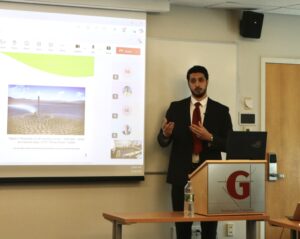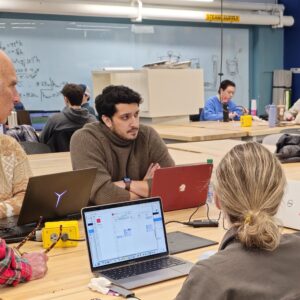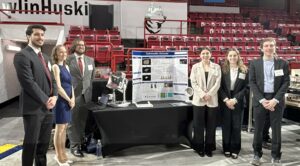Unexpected Path to Innovative Research on Concentrated Solar Power

Benjamin Lynch, E’24, PhD’29, mechanical engineering, was always interested in engineering. His non-traditional path to Northeastern led him to discover his zeal and fascination with concentrated solar power and renewable energy. During his PhD studies, he had the opportunity to pursue his passion and expand his capstone project into an extensive research project.
Benjamin Lynch would describe his path to Northeastern University as non-linear. He spent the beginning of his undergraduate career at two different colleges before coming to Northeastern. Engineering as a discipline always resonated with Lynch, additionally inspired by his dad, who is also a mechanical engineer; Lynch knew this was the right degree program for him. Lynch said the thing that appeals to him the most about mechanical engineering as a subject is “It’s not about just the technology itself, but also the ability to see the world through a different lens, or a view that you otherwise might not take. I feel like engineering in general, and mechanical engineering specifically, is a good way to get exposed to that.”
Lynch graduated with his bachelor’s degree in mechanical engineering in 2024 and was awarded the Chair’s Fellowship award to continue his education at Northeastern as a PhD candidate in mechanical engineering with a concentration in thermofluids. Lynch said he saw this award as a once-in-a-lifetime opportunity to “pursue something that would ultimately help me craft my career, my future, while also being able to give back to the community with this new set of skills”. As Lynch continues his PhD program, he will also be completing his master’s degree along the way.

Lynch giving his Challenge Project presentation at the Gordon Institute.
The first year of Lynch’s PhD program was spent at the Gordon Institute of Engineering Leadership. Lynch said his time at the Gordon Institute was dedicated to both leadership and project development. The Gordon Institute program is designed to enhance technical engineering knowledge with leadership skills that can be applied in team project settings. Lynch spent the year building on his senior capstone project involving concentrated solar thermal power, and he was given a provisional patent to develop his research further. Lynch says his experience at the Gordon Institute was a great opportunity to refine his own skill set and was one of the highlights of his academic journey at Northeastern so far.
Co-op Experience and Capstone Project
In Lynch’s fourth year, he assisted in research with Professor Hameed Metghalchi, COE Distinguished Professor Yiannis Levendis and Associate Professor Emeritus Gregory Kowalski through his capstone project. Lynch’s capstone project involved concentrated solar power energy, and as this was his first introduction to the subject, his interest was piqued. He said concentrated solar power struck a chord with him because of “the kind of potential that it holds to be a really impactful part of the renewable energy spread in the future.”

Lynch meeting with his senior capstone group to work on their Deformable Heliostat Project.
After working with these esteemed professors, Lynch turned his research opportunity into a co-op experience. Working closely with the National Renewable Energy Laboratory and the Department of Energy on this research project, Lynch was very hands-on in the research process and developed a provisional patent through Northeastern. He decided to develop a patent after reading literature reviews on concentrated solar power in the lab and seeing a need for deeper exploration into this tech, since it is a novel approach. From there, he started prototyping, testing, designing and experimenting with the technology. His lab would collaborate during weekly design meetings to perfect their patent. Lynch continued to work on the patent while exploring the technology during his time at the Gordon Institute.
Lynch appreciated the freedom he was afforded in turning his abstract idea into a concrete research project and patent. This opportunity has been exciting for him to work on, and he has dedicated a great deal of time to it. Currently, Lynch has been writing a paper on how concentrated solar power is manifesting in other parts of the world, specifically looking at China. In his paper, Lynch will explore how “China’s renewable energy spread is incorporating concentrated solar power and essentially how that’s going to shape their future in the realm of renewable energy.”

Lynch and his capstone team presenting their final Deformable Heliostat Project prototype.
Future Perspectives
With a few years left in his PhD program, Lynch continues to enjoy the opportunity to expand on his research on concentrated solar power. He revels in how he has been able to dedicate his studies and time to exploring a subject he is fascinated by. After he finishes his PhD program, Lynch said he would like to obtain an industry job working with renewable energy. The renewable energy field and the work within it have always aligned with Lynch’s personal values. He has always wanted to be able to use his skills to give back in a positive way to society. Lynch said, “It checked both of those boxes for me; it’s interesting how it works, but it’s also interesting to know it’s making an impact that is on a global scale.”